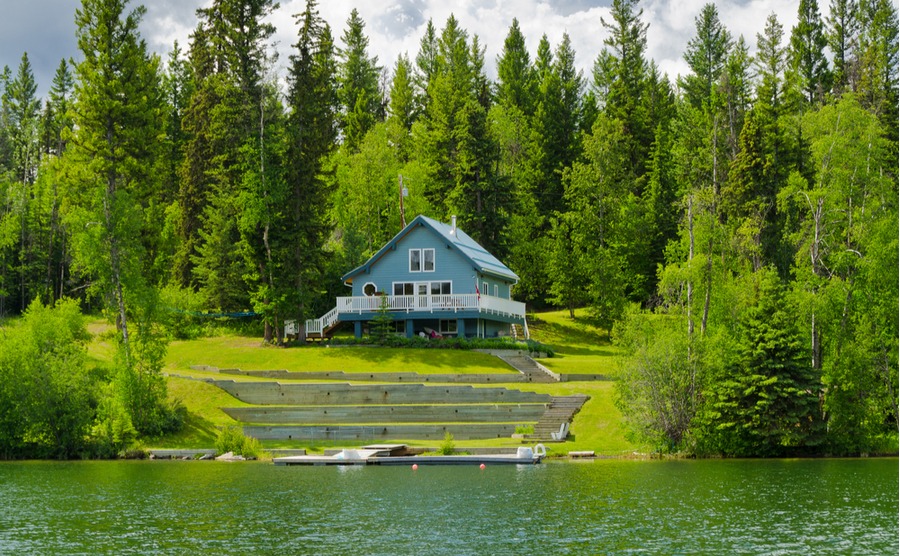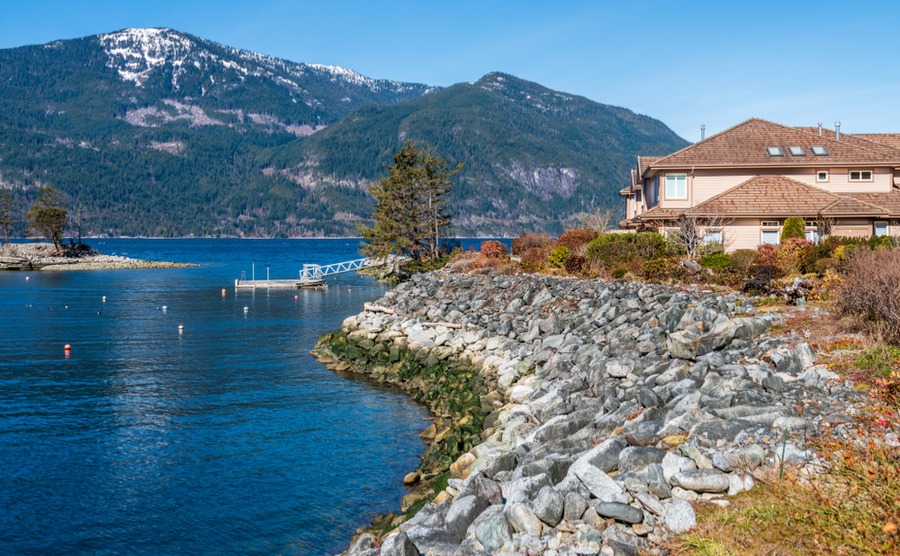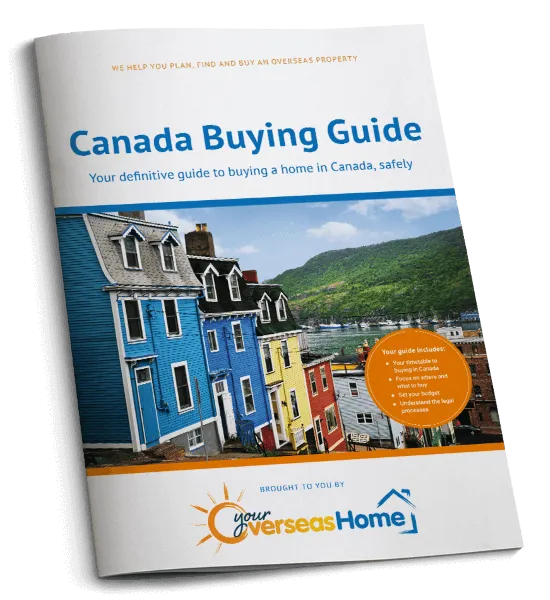Did you know that Canada makes up more than 6 per cent of the Earth’s surface? That’s a whole lot of space! Great news for anyone moving to Canada with dreams of building their own home. But where do you start? With a plot of land. Today, we’re running through how to select a plot and explaining the first steps on your self-build journey in Canada.
Am I allowed to buy land to build on in Canada?
In true Canadian style, home- and land-buyers from all countries are welcome in Canada. In fact, there is so much space in Canada, that free land is being given away in some areas, as long as those that take it on agree to develop it. If you’ve been watching Grand Designs and you’ve caught the self-build bug – the first step you’ll need to take is sourcing that perfect plot.
What are my building options?
When you move to Canada and decide to build your own home, you have a couple of options. Firstly, you can buy land to build on in Canada, employ an architect to design your dream home and have a builder complete the process. This way you get the home you want, exactly as you want it. Alternatively, you can buy a home from a developer, which is called buying off-plan. Choosing this approach might restrict you to certain designs or property sizes, but you’ll be able to pick your own fixtures, fittings, and certain added features.

Find out how to choose your perfect plot of land to build on in Canada.
Where do I find the land?
Once you’ve decided on your corner of the country, start contacting local real estate and land agents to let them know what you’re looking for. Also, find land for sale on websites like Prime Location, Kijiji, Land Watch and Land Sale Listings. Or, should you be in the market for your very own island, head to Private Islands Inc. Additionally, it’s a good idea to get in touch with property developers – they might be able to sell you a plot, and build the house for you. Should you chance by a plot of land that looks perfect, but you can’t establish who owns it, you can contact the Land Registry for the province. Some Canadian provinces, Ontario for example, have multiple land registry offices. Others have just a couple, so do double-check you have the right one. Before you call, make sure you can tell them exactly where the plot of land is. There is a fee charged to discover who owns the land, which differs marginally by province.
Where do I find the experts I need to make this dream a reality?
Selecting an architect to work with you when you move to Canada is a simple process. Head to the Royal Architectural Institute of Canada to see their directory of architects. Fill in the online form outlining your needs and a list of reputable professionals in your area will be sent to your inbox. Also, word of mouth is invaluable – ask around for respected architects in the area.
Likewise, make sure that the builder you select is a member of the Canadian Home Builders’ Association, and that they hold a license for the province where you plan to build. Always ask to see examples of homes and developments they have completed. Check out their handy work and get intel from their clients on how the builders operate, and crucially, whether they are happy with the finished product. Reputable builders will be able to produce a list of happy clients at the drop of a hat, so don’t be shy when it comes to your due diligence. Also, reputable builders offer warranties. It’s possible to check out whether their record is decent, or whether many people have had to cash them in. There are home warranty organisations in each province, most of whom will give you warranty reports for the builders free of charge.
Additionally, a lawyer will be needed to walk you through the legalities of buying land to build on when you move to Canada. The lawyer that you choose should be a member of the Canadian Bar Association and be registered to practice in your province. You can search for Canadian lawyers here.
What factors do I need to consider when buying a plot?
1 – Location
Once you’ve chosen your province, you need to look at the exact location of your plot. What kind of view do you have? What amenities are you close to? Who are your neighbours? If they are farmers, bear in mind stinky odours from could be problematic. What might the surrounding land be used for in the future? Are you under a flight path? If your plot is rural, how will you access it? Don’t make the common mistake of buying a plot of land and then having to pay an extortionate amount to the neighbouring land owner to use the strip of land you need for your driveway! Consider how building materials will be delivered to the house? If you’re in the middle of nowhere, delivery costs and logistics need to be factored into the budget. Establish whether the plot is connected to electric, gas, sewerage and water. If not, connection costs will need to factored into your budget. Also, establish whether you have good internet and mobile phone access, because if not – you could be facing a lifetime of standing in the garden hoping to get a little service!
Between putting in an offer and paying your money, you can the exchange rate moves dramatically. Find out how to safeguard your money from the volatility of international transfers in your free Property Buyer’s Guide to Currency.
2 – Is the land suitable to build on?
Some plots might be idyllic, but if they aren’t suitable to build on you could find yourself stuck with a piece of land that’s impossible to sell. In addition to whether it is big enough to build your dream property on, is the site sloped? What’s the soil like? Will it be possible to build decent foundations? You must check the water table on your piece of land – how wet it is will determine whether or not you can build on the land, and what type of property can be built. Finding this out early will save you a costly mistake! Levelling out land to be able to build on it can be very expensive, so keep that in mind if you’re looking at a plot on the side of a mountain. Also, are there any obstacles that could affect the build, i.e. water pipes, electricity pylons, trees, existing buildings?
3 – Can you obtain a building permit?
Before the building can commence, you must obtain a building permit. These permits are the official go-ahead to break land, and are issued by your local government department. The permit has a unique number on it, and the document must be clearly visible on the construction site. Typically, the builder or architect will take care of this, but if you are taking the project on yourself – it’s down to you. When applying, you must submit all plans and designs for the work – the more complicated the designs, the longer it will take for the permit to come through. Please note – applying for the permit will cost you, but there is no guarantee it will be issued. Permits tend to range in cost from CAD$360-$1,730. Also, building inspectors can drop by the site any time. Should your permit not be displayed correctly, you will foot the bill – even if the builder or architect is the one who applied for the permit in the first place!

Make sure you have a building permit for your property.
4 – Is the site regulated by the Conservation Authority?
Certain plots of land are regulated by the Conservation Authority, and if that applies to your plot, securing a permit can take a while and be pricey. Even if you do secure the permit, you could find yourself having to stick to their guidelines about how and where you can build. While it is definitely possible to buy land to build on that is regulated by these guys, be aware that it could make things decidedly trickier, and take a considerable while longer. The agent selling you the land will be able to tell you whether or not the land is zoned by the Conservation Authority – make it one of the first questions you ask, so you don’t waste precious time.
5 – How is the land zoned?
Certain plots of land have been zoned, which means they are subject to restrictions on what can be built. This could affect where you build, how high, what you’re allowed to do on the land and so on. Make sure you check specifics with the realtor before you decide.
How much will it cost?
According to Home Builder, the average cost (per square foot) of building a detached home in Canada’s most popular cities is as follows.
- Vancouver –$130-$230
- Toronto – $110-$210
- Calgary – $115-$150
- Montreal – $95-$160
- Halifax – $115-150
Get the best possible price when buying land to build on in Canada with our free guide, How to Negotiate Abroad.
One of the major advantages of building your own house is that you can, to some extent, control the budget. You can save money in a number of ways. For example, shop around for your contractors. Always seek multiple quotes to ensure the price you secure is competitive. While it might be tempting to go with the cheapest option, always do your research – they might be cheap for a reason! Secondly, if you’re not bothered about working with an architect to design a home that is completely unique, you can save a considerable sum by choosing an existing home design. This automatically removes the cost of the architect – which can cut a considerable amount from your budget. Furthermore, you can cut costs by doing some of the labour yourself…although, unless you’re a professional, we’d leave the plumbing, electrics, and so on to the experts.
Anyone building a home should be considering how eco-friendly their property is. Does it need to be enormous? A smaller property that still matches your needs will be cheaper. You can also deck the property out with reclaimed, recycled and repurposed goods, which will save you cash, while giving the property a stylish look. Salvage yards and shops selling such goods are found all across Canada, or you can check out Habitat for Humanity, a charity that sells everything from furniture to the kitchen sink (literally). There are ways to cut costs – just make sure you don’t scrimp on the important things!







